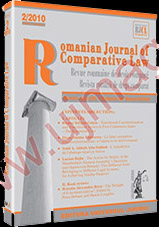Transitional Constitutionalism and Transitional Justice in post-communist States – the Romanian Case
Transitional Constitutionalism and Transitional Justice in post-communist States – the Romanian Case
Author(s): Bianca Selejan-GutanSubject(s): Law, Constitution, Jurisprudence
Published by: Universul Juridic
Keywords: transitional justice; separation of powers; rule of law; access to justice; fundamental rights; dialogue of judges
Summary/Abstract: The article discusses aspects of the contemporary legal and judicial history of the Romanian and ‐ in context ‐ of some other Eastern European countries’ patterns regarding the transition to democracy and the rule of law, taking as a landmark the situation of Romanian courts versus three of the main constitutional democratic principles: separation of powers, access to justice and human dignity, over the two decades since December 1989. One of the first steps forward in the transition to democracy was that, since 1994, Romania has been a party to the European Convention on Human Rights. Moreover, the Romanian Constitution gives ratified Human Righs treaties – and thus the Convention ‐ direct applicability and supremacy over the domestic law (at an infra‐constitutional level). However, the Romanian Courts were somehow reluctant to admit, formally, the priority of international human rights law and substantially, the privileged regime of human rights as a „public order” in statu nascendi. Resistance and obedience were the two types of attitude manifested by Romanian courts – including the Supreme Court and the Constitutional Court – over the past 20 years. In this respect, principles like separation of powers and access to justice have been disregarded by the authorities and even by courts, despite their constitutional consecration, in an attempt to give priority to political interests. Some of the most recent judgments shall be considered, to illustrate the main ideas, such as Sandru and others v. Romania (November 2009) ‐ the „Revolution case” or the „nationalised buildings jurisprudence”. One particularly interesting issue is the principle of human dignity as a „supreme constitutional value”, the right to human dignity and how they are interpreted by the Romanian Constitutional Court in the context of incriminating/disincriminating libel. The article paper shall also refer to, in the context of the main topic, theoretical issues like: dialogue of judges, political influence to the judiciary, legal methodology in the judicial system.
Journal: Revista Română de Drept Comparat
- Issue Year: 2010
- Issue No: 02
- Page Range: 283-310
- Page Count: 28
- Language: English
- Content File-PDF

